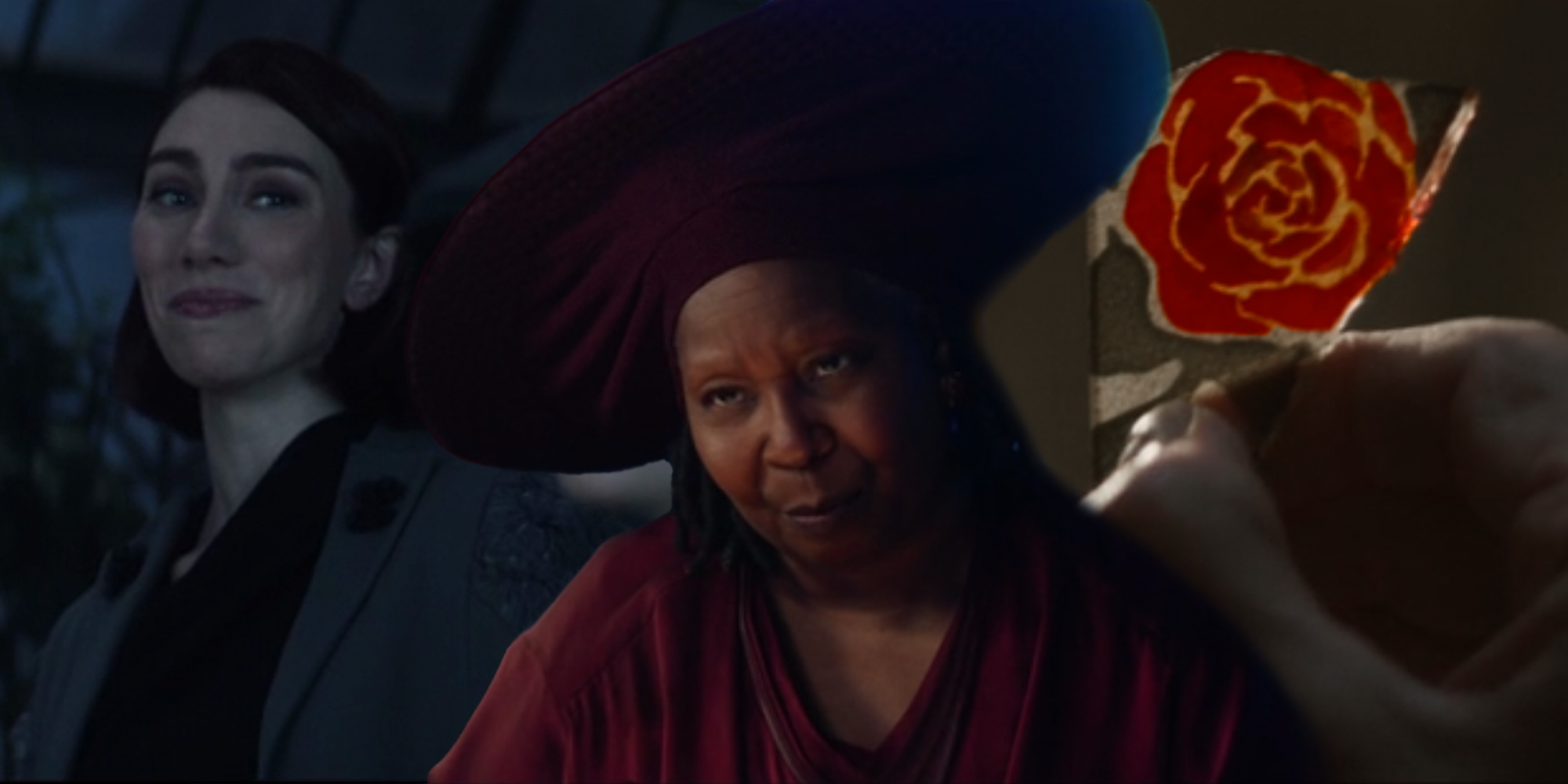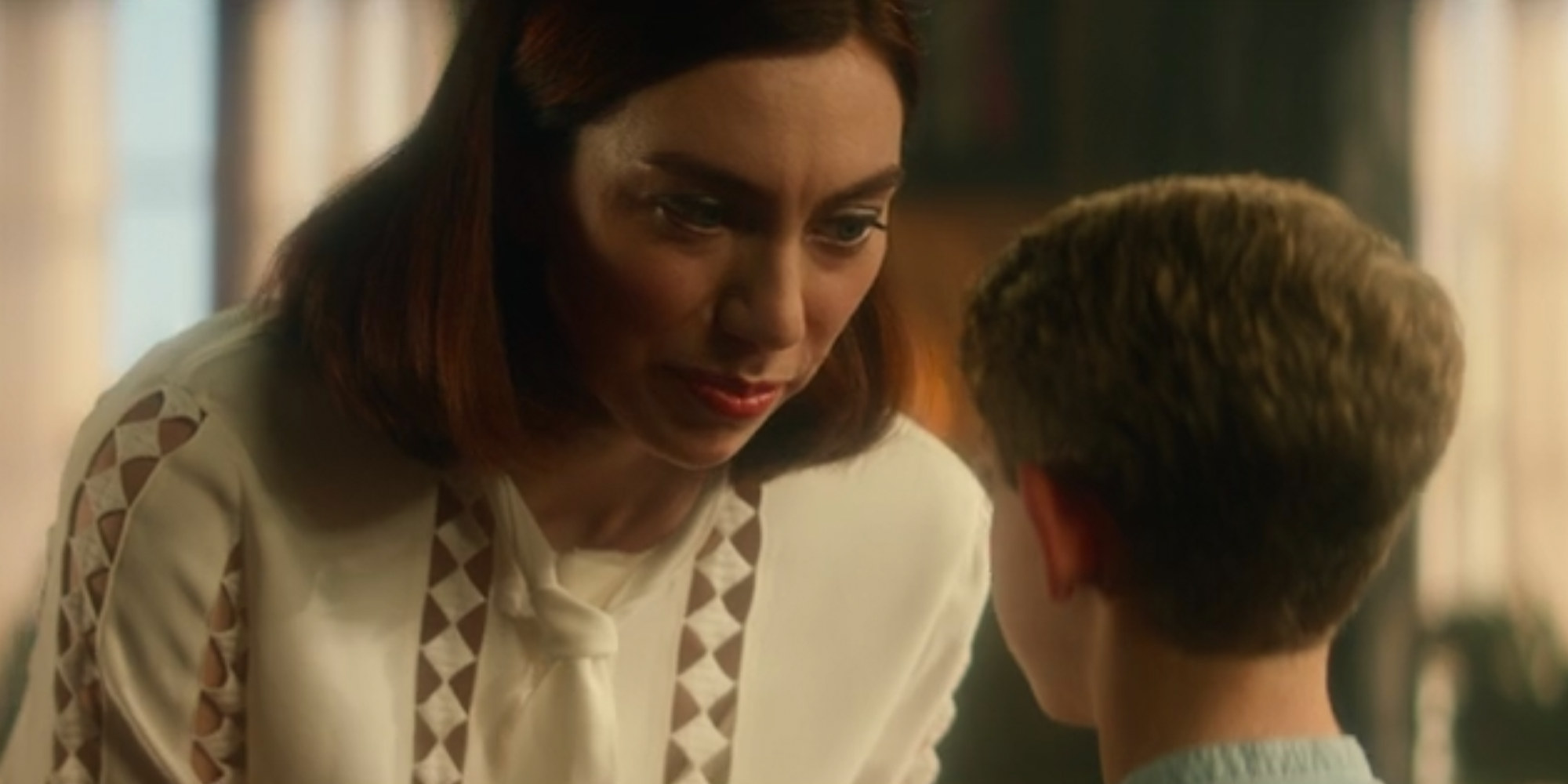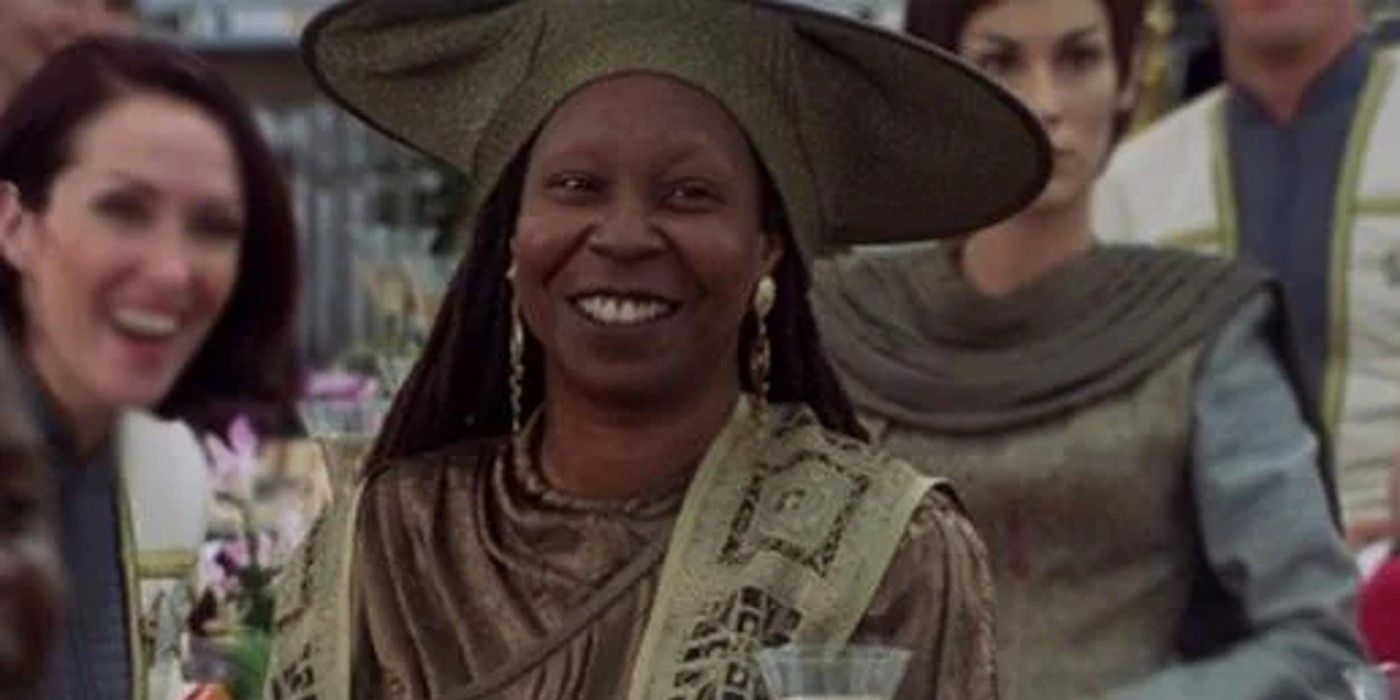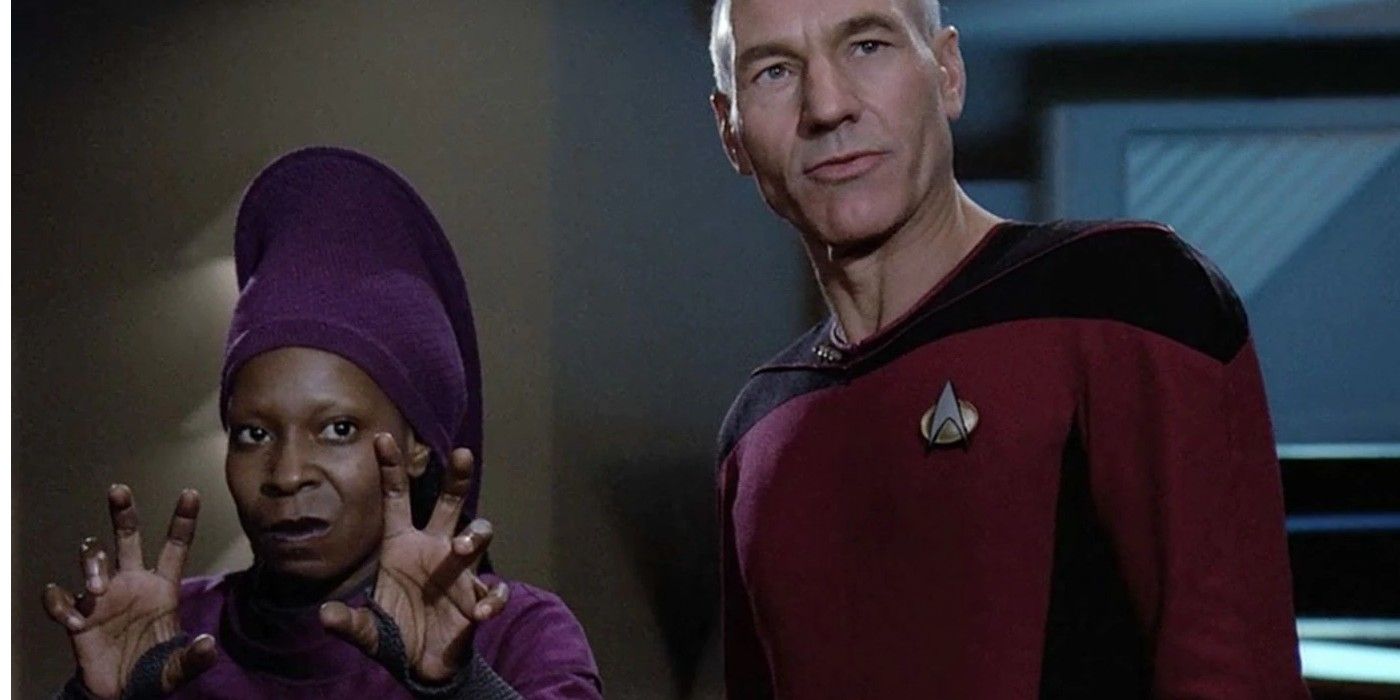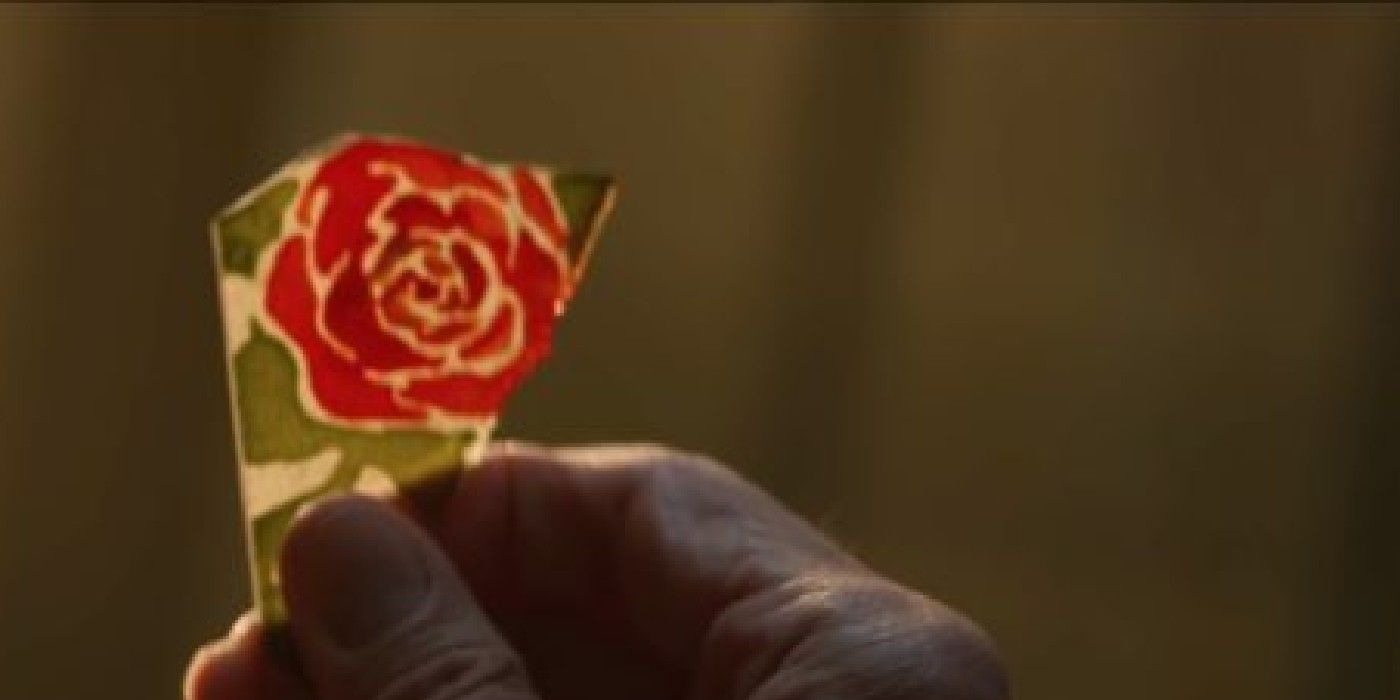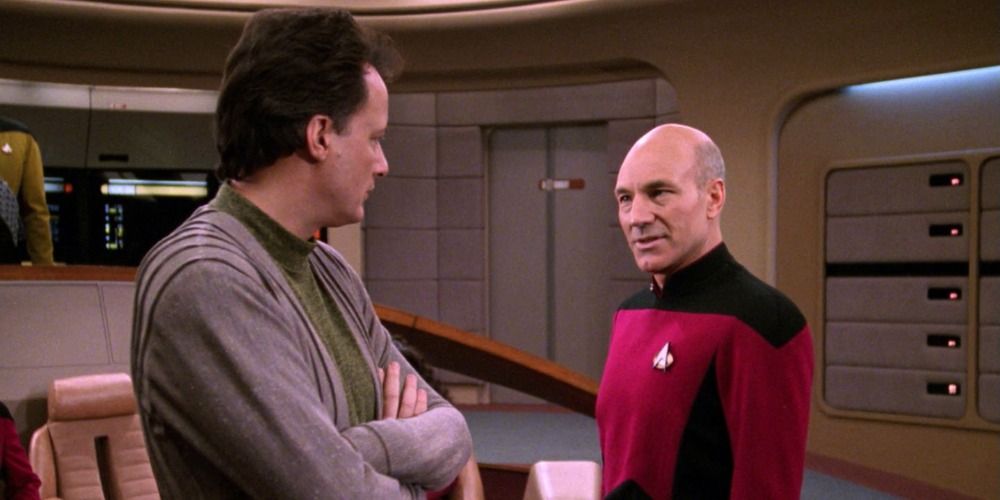Star Trek: Picard season 2 opened with an emotional scene, as Jean-Luc stood in the ruins of an old greenhouse on his French vineyard estate, remembering his mother. Little has been shown throughout Star Trek canon about Yvette Gessard-Picard, though she did make an appearance in one episode of Star Trek: The Next Generation (played by Herta Ware) in a region of space where thoughts become reality. And while it has always been assumed that she was human, the theory that Yvette Picard may have actually been at least part El-Aurian is not only possible, but plausible.
Jean-Luc's history and family tree have not been delved into very deeply. His father, Maurice, was known to be a traditional man, against the use of technology and hard on his sons. He and Jean-Luc became estranged when the latter joined Starfleet, and Jean-Luc always regretted not making amends with his father before he died. Star Trek fans also know that Jean-Luc had a brother, Robert Picard (Jeremy Kemp), who followed in his father's footsteps and ran the family estate in the traditional way. Robert would eventually marry and have a son, René, who Jean-Luc had a close relationship with. Tragically, both Robert and René perished in a fire in 2371.
What the Star Trek canon (and non-canon works) have done is give viewers alternative versions of the Picard family. Just as Yvette appeared as an illusion brought on by Jean-Luc's thoughts, The Next Generation episode "Tapestry" has Q using the image of Maurice to convince Jean-Luc that he himself had died. The non-canon TNG comics presented a future in which young Claude did not die and became an authoritarian leader on Earth. And, in the film Star Trek: Nemesis it is revealed that the Romulans cloned Jean-Luc (Shinzon, played by Tom Hardy) in order to create a plant to take over Starfleet, again creating a possible "road not taken" scenario. Little else has been examined, so to understand the possible links to the alien El-Aurian race, viewers must dig deeper into both Jean-Luc's history and Star Trek lore.
Everything We Know About Yvette Picard
Prior to Picard season 2, viewers knew very little about the Picard family matriarch. Even as an adult, Jean-Luc lovingly refers to her as "Maman", which is the French equivalent to "Mommy" or "Mummy." It is known that Yvette encouraged Jean-Luc to play piano, a hobby that he abandoned due to his dislike of playing in front of large audiences, but he later regretted quitting because it gave Yvette joy. She also sang to him, and had disagreements with her husband about installing a replicator in the family home. She had died prior to 2364, but no details were given on her passing.
As the opening scenes of Picard season 2 show, Yvette and Jean-Luc seemed to have a very close relationship, with her providing the confidence and support that his tenuous relationship with Maurice lacked. The two are shown exploring the greenhouse at the family vineyard, Château Picard, and as Jean-Luc's memory entwines with the present, he is shown holding a piece of broken glass painted with a stylized rose. This piece of glass plays heavily into the opening credits of Picard season 2, which likely indicates that Jean-Luc's relationship with his mother has bearing on the greater story being told.
Before Picard, no signs were given that Yvette's relationship with Maurice Picard was violent or tumultuous, beyond the mentioned disagreement about the replicator, which was never treated as volatile. And while Star Trek lore has always indicated that Jean-Luc spent his entire life at Château Picard, in the Star Trek: Picard season 2 premiere, "The Star Gazer", it is implied that the family had just moved there from Paris. Yvette tells young Jean-Luc he will learn to love living in the country, and that Paris is only a transporter trip away. She tells him that while his father tends the property and his brother is at school, the two of them can spend their days making the greenhouse beautiful together. She even says that they could paint the glass windows - and while viewers don't see the windows painted and whole - the shard that Jean-Luc holds in the present means that they eventually did.
Star Trek's El-Aurians Species Explained
The El-Aurians—a race of aliens known to be "listeners"—have extremely long lives. They have played a significant role in Star Trek, despite relatively few encounters. According to Guinan, the franchise's most well-known El-Aurian, her people were all but exterminated by the Borg in 2265. Only a handful survived the attacks, most of which were off-planet at the time. Guinan herself, who would serve as the ship's bartender on Star Trek: The Next Generation, has been shown to have visited Earth as early as 1893, easily passing for human long before the Earth had any knowledge of alien races. Guinan has already been shown living on Earth in 2400, and may have also been there in 2024.
While El-Aurians can die just like any other race through violence or illness, if they remain healthy, they can easily live many centuries. Though physically almost identical to humans, the aliens' aging process is far slower than humans. Guinan, played by Whoopi Goldberg, is at least 500 years old when she appears in Picard season 2 and has stated that she's been married 23 times. El-Aurians have also been shown to be very sensitive to time distortions and changes to the timeline. Their empathic abilities, along with the sensitivity to time alterations, could provide clues to Yvette's true identity.
Yvette Being El-Aurian Could Explain Picard's Guinan Relationship
When Guinan first joined the Enterprise-D in Star Trek, The Next Generation, it was made clear that she was there at the personal request of Jean-Luc Picard. And while the show never fully explained the context of their prior relationship, she did say that they were "more than friends and more than family." The novel, Stargazer, gives some details of their relationship, but the connection she has to Jean-Luc still seems a bit underdeveloped and unexplained. And while Guinan has a history of animosity with Q, if Yvette Picard was an El-Aurian who had survived the destruction of their homeworld, Guinan's attachment to Jean-Luc would make far more sense than a distaste for his nemesis. She could view him almost like her own child, as the future of a race that had its future taken from it. Especially if Guinan and Yvette had been friends prior to the latter's death, Jean-Luc could serve as a connection to someone Guinan had loved, and vice versa. She may be serving his mother's memory by caring for Yvette's son.
What Picard's Vision Could Mean
It is possible that the visions Jean-Luc experienced were actually the result of time alterations made by Q. In "The Star Gazer," a young Jean-Luc asks his mother if she and his father will argue less, since they've moved to the country. The tone of the scene changes suddenly and the memories, mingled with Jean-Luc's pensive present self holding the glass shard, become entwined with darker visions, including a glimpse of Yvette being dragged away. The additional visions have a strange feel to them, sharp and stuttering—possibly supernatural. The nature of the visions mingled with memories could actually indicate that Jean-Luc was experiencing a reaction to the alterations Q was beginning to make to the timeline. It is possible that the violent events that Jean-Luc envisioned never happened to the Jean-Luc who has long served Starfleet, but rather that they were events that happened to the Jean-Luc who helped rule the Confederation with an iron fist in Q's dystopian timeline.
If Jean-Luc were half El-Aurian, his sensitivity to timeline alterations could have allowed him to glimpse pieces of both of his timelines just before they merged. Viewers may wonder why, if Jean-Luc's mother had been El-Aurian, he had never experienced that sort of temporal reaction before Picard. However, it is possible that when his consciousness was transferred into a synthetic body at the end of Picard season 1, the "human" part of his makeup became less. Given the El-Aurians' more cerebral existence, focused so much on empathy and perception, it could have more impact on his consciousness than his human nature. And now that Jean-Luc's character changes also include the synthetic body, perhaps he is more connected to his El-Aurian mother than ever before.
Q's Infatuation With Picard Would Be Redefined
Q, a nearly-omnipotent member of the Q Continuum, has played the part of Jean-Luc's nemesis for much of his career in Starfleet. Appearing first in the Star Trek: The Next Generation episode, "Encounter at Farpoint," Q has tormented, teased, and tested the Starfleet officer throughout canon. If it was revealed that Yvette Picard were El-Aurian, it could provide a much clearer reason for Q's strange obsession with Jean-Luc. Q's infatuation plays heavily into Picard season 2, as he alters the timeline to show Jean-Luc "the very end of the road not taken."
And while Q has said that he personally has an interest in humanity because he sees them as having the potential to evolve into a Q-like species, it doesn't necessarily explain his infatuation with Picard, himself. While he's appeared to other Starfleet captains in other properties, he doesn't return to them. With Jean-Luc, Q returns again and again. He pushes him into situations that test and traumatize him, and though he has cultivated the persona of a pest or rival, he is an all-powerful being who can see the entirety of all of time, and every possible timeline. There's no likely reason for a being such as this to form such an attachment to a single human—outside of showrunners realizing the natural on-screen chemistry between Patrick Stewart and John de Lancie, of course. But perhaps, Yvette's true nature as an empathic and time-sensitive El-Aurian is the reason Q focuses on Jean-Luc as the key to human evolution.
While there's not yet any concrete evidence of Yvette having been El-Aurian, Picard season 2 has clearly tied her existence to both Guinan and Q's most recent test in Picard season 2 by positioning Jean-Luc's visions and memories so prominently, both in the opening scenes of the season and in the opening credits of each following episode with the rose-painted glass. In addition, Picard showed Guinan probing Jean-Luc for the secret he's never told her, which promises one final reveal for the long-time friends. By introducing an El-Aurian heritage for Jean-Luc Picard, Star Trek could be opening far-future appearances for the Shakespeare-quoting Starfleet officer, including perhaps on Star Trek: Discovery, or the forthcoming Section 31 spinoff. But whether or not the franchise chooses to make Yvette Picard an El-Aurian, viewers can expect some explosive revelations as Picard season 2 continues, and if history repeats itself, Jean-Luc will never be the same.
Star Trek: Picard airs Thursdays on Paramount+

